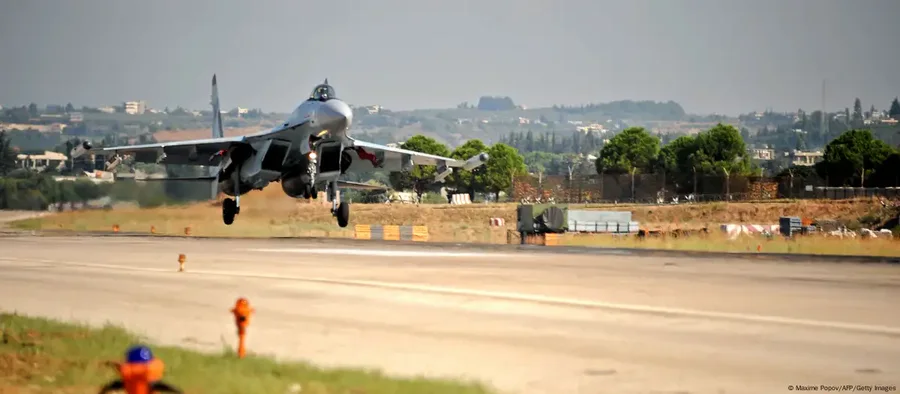
Stay or leave? After the victory of the Islamists in Syria, Russia weighs how to act in the future with its military bases. First of all, the naval base in Tartus is very valuable and irreplaceable.
After the victory of the Islamist rebels in Syria and the escape of President Bashar al-Assad, will Russia lose its two military bases there? This case is open and there does not seem to be any sign of a quick decision. The spokesman of the Russian president, Dmitri Peskow, said on Monday (09.12.2024) that it is "early" to talk about this. Russian media announce that the Islamists who came to power in Syria, led by the Hayat Tahrir al-Sham (HTS) group, have guaranteed the security of Russian military bases. The facts speak louder than a confirmation from other sources. Russia has two bases in Syria – the naval base at Tartus on the Mediterranean Sea, a legacy of the Soviet Union, and since 2015 the military airport at Hmeimim.
"Until now, although there are activities of transport aircraft in Hmeimim, it cannot be a question of proportions that would mean a complete evacuation", says Gustav Gressel, former expert at the European Council on Foreign Relations (ECFR). Russian ships are indeed in the Mediterranean "for maneuvers", but they are not far from Tartus. "I think that after the quintessence Russia will negotiate to keep the bases in Syria," Gressel tells DW. "If these bases were to be given up, the evacuation would actually have to begin."
Expert: The naval base in Tartus is more important
Military historian Colonel Markus Reisner believes that the naval base in Tartus is for Russia "strategically more important" because "from there forces can be projected into the Mediterranean". The air base in Hmeimim has been important for Moscow, to protect the Assad regime from the rebels. "But now that reason falls," notes Reisner.
British political scientist Mark Galeotti, author of the book "Putin's Wars", believes that both bases are "very important for Russian activities in the Mediterranean and in Africa". "It's interesting how quickly it (Russia) is trying to reach an agreement with HTS," says Galeotti. Recently, Russian Foreign Minister Sergey Lavrov described this group as "terrorist", last week Moscow started calling them "rebels". Even before the fall of the Assad regime, Moscow's tone towards the Islamists in Syria was becoming "much more polite", underlines Galeotti.
What can Moscow offer the rebels?
"Russia is hoping for a deal with HTS," says Galeotti. But what can Moscow offer? Although the rebels are supported by Turkey, they "don't want to be Turkish substitutes, they need allies and relationships", Galeotti estimates. This is where Russia comes into play. "The Russians are quite cynical and pragmatic, this could give HTS a chance to diversify its dependence on Ankara", thinks the British expert. In this context, he recalls that Moscow is present not only militarily in Syria, but also maintains relations economic.
Burcu Ozcelik, a Middle East expert at the British think tank RUSI, is not convinced that the Syrian rebels can quickly respond to Moscow's wishes. "It is highly doubtful that HTS would rush to accept (President Vladimir) Putin as an ally or give the green light to a long-term Russian military presence on the Syrian Mediterranean coast," Ozcelik notes. "Primarily in the background, that Assad has received asylum on Russian territory." Ozcelik foresees long talks, in which regional actors Russia and Iran "will try to adjust their foreign policy towards Syria."

Where will the Russian army leave Syria?
If the Russian army has to leave Syria, even partially, where will it move? "They don't have good options," says Mark Galeotti. In his opinion, Syria under Assad has been strongly dependent on Moscow. There is no other place like it in the region.
Among the possible options, which are mentioned most often, are Libya, when Russia maintains contact with General Khalifa Haftar. Russian mercenaries of the Wagner group fought by his side". The Western press has announced Russia's intention to establish a naval base in Libya. It could be Tobruk, believes Markus Reisner.
Mark Galeotti says, that this option cannot be realized quickly, because there is no ready infrastructure there. The same applies to Sudan, with whose government Moscow has been negotiating for a naval base in the Red Sea for years. "Wherever they go - in Libya, Mali, Sudan - they will not find a position like in Syria", the expert emphasizes.
Limited consequences for the war in Ukraine
In this context, another issue is discussed: If Russia withdraws its army from Syria, what does this mean for the Russian war in Ukraine? "To be honest these consequences cannot be taken into consideration," Galeotti thinks. According to him, the number of forces that Moscow can move from Syria to the Ukrainian front has no weight.
Gustav Gressel argues similarly. He concludes that: "For Ukraine, the good news (from Syria) is limited". Russia does not have the ability and the desire to open a second front, while it is waging war with all means against Ukraine. "Ukraine cannot benefit significantly from the weakening of Iran due to Israel's war," the expert draws attention. The only apparent positive consequence for Kiev may be that "some people in the West may become more emboldened," and that "Putin's weakening may impress Trump," Gressel underlines. But whether this will happen is an open question. /DW/ (A2 Televizion)











